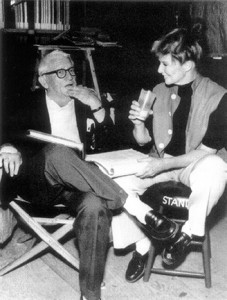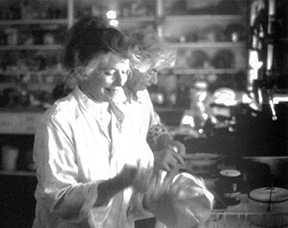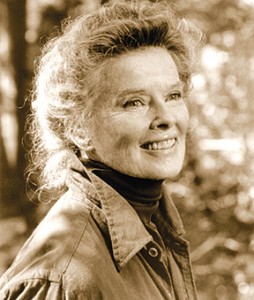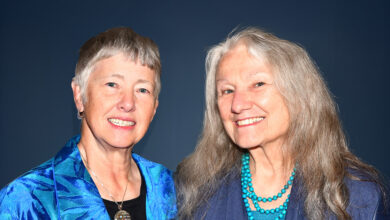Kate continued 3

Speaking of love, and since this is for our Valentine’s Day issue, I specifically wanted to get into the love story between Hepburn and Spencer Tracy. I know it’s kind of complicated, but can you summarize that relationship?
It was a devoted, passionate, complicated, and always loving relationship. That didn’t mean that Tracy didn’t treat Kate terribly sometimes. He did; he could be brutal. But she was so devoted to him that this much of the legend is true: She did make the last three or four years of his life much better than they would have been otherwise. She made sure that he was happy and healthy, and he would have died far sooner than he did if Kate hadn’t come in to take care of him. Just because it wasn’t the fairy tale that Kate later tried to make it seem, it doesn’t mean that it wasn’t a significant and important and loving relationship.
But there was not much equality in that relationship, right?
Definitely. And she wanted it that way. You can see that on the screen, too, where she always let him have top billing. In every Tracy and Hepburn film, she somehow gets taken down a peg by him. He teaches her the lesson, rather than the other way around. It’s why I actually prefer her films with Cary Grant or The African Queen with Humphrey Bogart, because she’s equal. In some cases she’s ahead of the guy in these films. But with Tracy she always took the submissive, supporting, secondary part both in life and on screen.
And wasn’t a big part of that how she grew up?
Sure, absolutely. For all of her feminism, her mother subscribed to the notion that the ultimate authority came from the man and always deferred to Dr. Hepburn. So Kate thought that was how she should live as well. She saw herself more like her father than her mother, so it was almost unnatural for her to behave this way with a man, and yet she did it because she thought that was the way to do things and it fed into what Tracy needed too, because he was suffering with his own conflicts. So she gave him what he needed.

I tried not to play psychologist in the book, to not put her on the couch. But I needed to try to understand as much as we could, and you see these recurrent relationships. Her relationship with Putnam, with Ford, and with Tracy are almost identical in so many ways. She failed with Putnam, and she failed with Ford, to get them happy, to get them on the straight and narrow, so to speak, and she was bound and determined not to fail with Tracy. So she did everything in her power to get him safe and get him healthy and get him on track.
Do you feel that she ignored that other elephant in the room — the fact that Tracy may have been wrestling with his homosexuality?
I’m certain that she knew it. Just as I’m certain that she knew it about the others as well. But as I said before about her comment about not believing in male homosexuality, she had a brilliant way of not seeing what she didn’t want to see, and she could push things far, far out of her mind, so that they did not exist. And, occasionally, “when Scotty would show up at the door to see Spencer, reality collided with her illusion.”
You mentioned Scotty…who is Scotty?
Scotty was and still is a very well-known figure in the Hollywood underground. Someone called him the “Heidi Fleiss of the Golden Age of Hollywood.” He had a little black book, and he sent girls to Howard Hughes and boys to Billy Haines. Scotty was and still is a very sharp, shrewd man, and a very funny and kind man as well. His stories about Spencer Tracy allowed me to understand Tracy in a way that I think most previous biographers have missed. I think I know this because in previous biographies Tracy has come across as rather mean-spirited and nasty and womanizing and drunk all the time. I think when we understand this about him, it gives us perhaps a more sympathetic view of his troubles.

Yes, it does. Back to love again: A friend said that she thought Hepburn was such a contrary person and wanted to know why we still loved her so much.
Because she made us love her. She knew what would sell, and that doesn’t mean that she necessarily lacked those qualities, but she knew that if she presented herself as this kind of evergreen moralist and this survivor and this wise old grandmother, we would love her. And we did.
We sure did.
We sure did. She was all of those things, but she also kept from us those aspects of herself that made her less likeable. Occasionally they’d slip through. There’s an article—an interview that Margaret Carlson did with her a few years before she died—that for the time was just scathing. It just pointed out that the other side of Kate, the contrary, ill-tempered side of her, but like she said to Dick Cavett in that famous interview, “I know how to put on the charm.” And she did. She put on the charm, and she made us all fall in love with her.
You said that you talked to friends, family, associates previously committed to silence. Why would they finally decide to end that silence?
First of all, she was gone. They felt perhaps more open to talking about her. But I also think for a lot of these people, the times keep moving, and as the times move people move and their attitudes change, and what was considered unmentionable or inappropriate for a biography suddenly is seen in a different light. I think people begin to say, ”Well, I can see that this might be important now. And this might be worth talking about.” I found that was the case with a number of her friends who said they’d like to understand her and all of her humanity. And to do that meant talking about things that perhaps she would not have wanted to talk about in her lifetime.
Again, since this is for our Valentine’s Day issue, do you have anything that you want to say about her and Valentine’s Day?
She was really never a very sentimental person. I can’t imagine her sending valentines. I’m working on Elizabeth Taylor now…
What’s it about?
I’m working on a book called How to Be a Movie Star, and it’s about Elizabeth Taylor. It’s not a strict biography. It’s more about looking at how stardom was made in the 1940s and 1950s up until the 1980s. Taylor is a much different study than Hepburn. She’s much more fun. She’s really someone who’s sent lots of valentines and loved getting valentines. It’s actually rather refreshing to go on to Taylor from Hepburn.
Blase DiStefano interviewed Carson Kressley for OutSmart‘s November issue (“More than Just a Queer Guy”).










